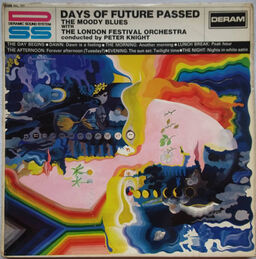
Days Of Future Passed
The Moody Blues With The London Festival Orchestra Conducted By Peter KnightVinyl · Engelsk · utgitt 1967 · Psykedelisk rock · Rock · Symfonisk rock
Ledig
Sølvberget, 3. etasje Musikk: 1 av 1 ledig
Plassering: LP-plater (sortering: q MOD)
Plassering: LP-plater (sortering: q MOD)
Henter eksemplarliste...
Fakta
Laster innhold...
Kopiér til utklippstavle
*0010893050 *008220408 eng *009 n *019 $bda,dg *024 $cNkr 350 *028 $aSML 707$bDeram *035 $a(NO-LaBS)16140771(bibid) *090 $bq$dMOD *24510$aDays Of Future Passed$cThe Moody Blues With The London Festival Orchestra Conducted By Peter Knight$hlydopptak *264 1$aS.l$bDeram$c1967 *300 $a1 LP$eGrammofonplate *336 $aframført musikk *337 $alydmedier *338 $alydplate$0http://rdaregistry.info/termList/RDACarrierType/1049 *5050 $aInnhold: The Day Begins ; Dawn: Dawn Is A Feeling ; The Morning: Another Morning ; Lunch Break: Peak Hour ; The Afternoon: Forever Afternoon (Tuesday?) / Time To Get Away ; Evening: The Sun Set: Twilight Time ; The Night: Nights In White Satin *511 $aBritish rock group from Birmingham, England, formed in 1964 and inducted into the Rock and Roll Hall of Fame in 2018. The Moody Blues are: Ray Thomas: flute, saxophone, harmonica and vocals [1964-2002]. Mike Pinder: keyboards, vocals [1964-1978]. Graeme Edge: drums, percussion and spoken word. [1964-2018] Justin Hayward: guitar, vocals [1966-2018]. John Lodge: bass, vocals [1966-2018]. Clint Warwick: bass [1964-1966]. Denny Laine: lead vocals, guitar [1964-1966]. Patrick Moraz: keyboards [1978-1991]. *520 $aDays of Future Passed is the second album and first concept album by English prog rock band the Moody Blues, released in November 1967 by Deram Records. With its fusion of orchestral and rock elements, it has been cited as one of the first examples of progressive rock. The album was recorded at a time when the Moody Blues were suffering financial difficulties and lack of critical and commercial success. Their parent label, Decca Records offered them a chance to record a stereo LP that combined their music with orchestral interludes. They decided to compose a suite of songs about the life of everyday man, with the group and orchestra mostly playing separately and mixed together. It was a moderate success upon release, but following steady radio airplay, particularly of the hit single "Nights in White Satin", it became a top ten US hit in 1972. It has since been listed among the most important albums of 1967 by Rolling Stone. *592 $ainnleveringssjekk$_30164100 *655 $aPsykedelisk rock$_39566500 *655 $aRock$_30652500 *655 $aSymfonisk rock$_45017200 ^